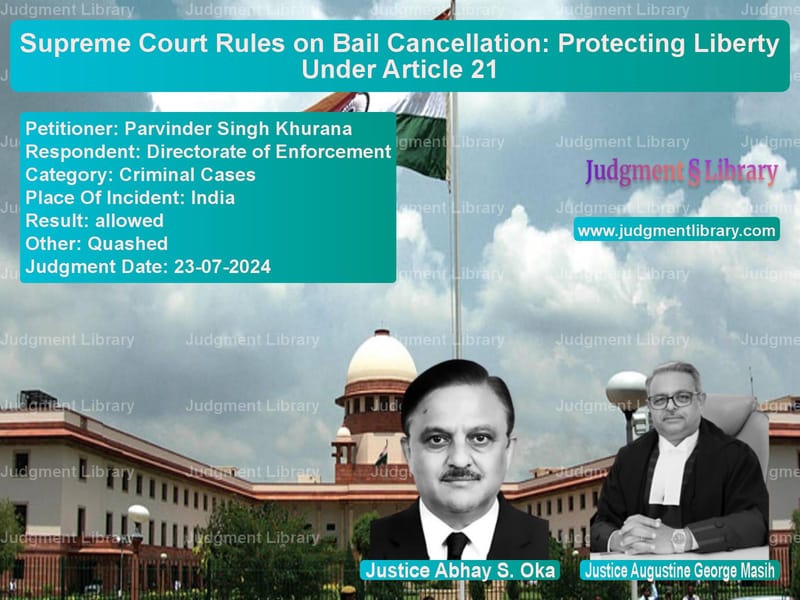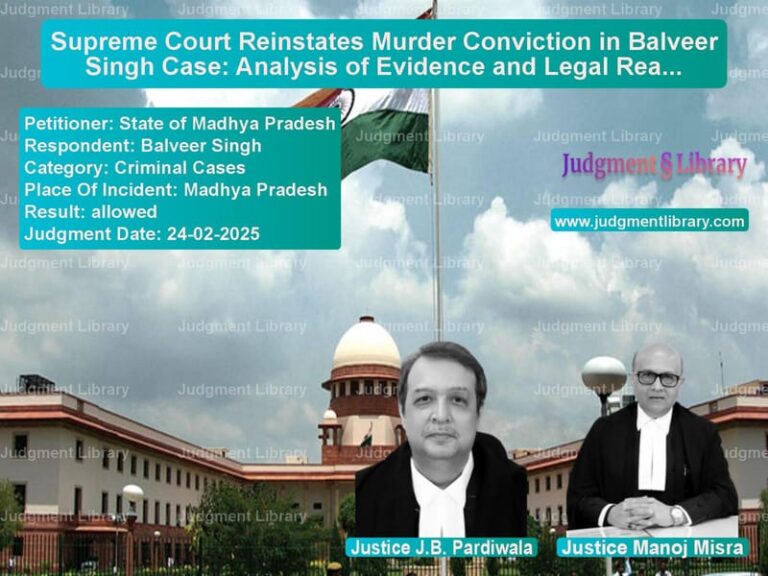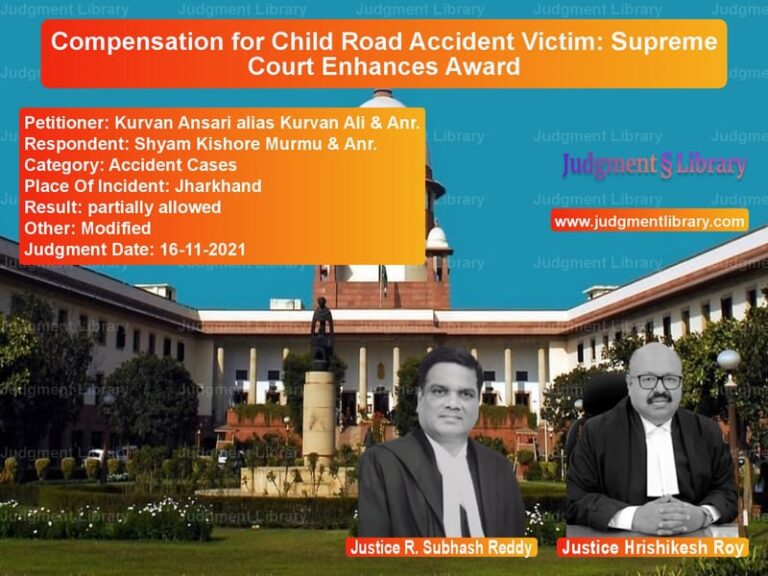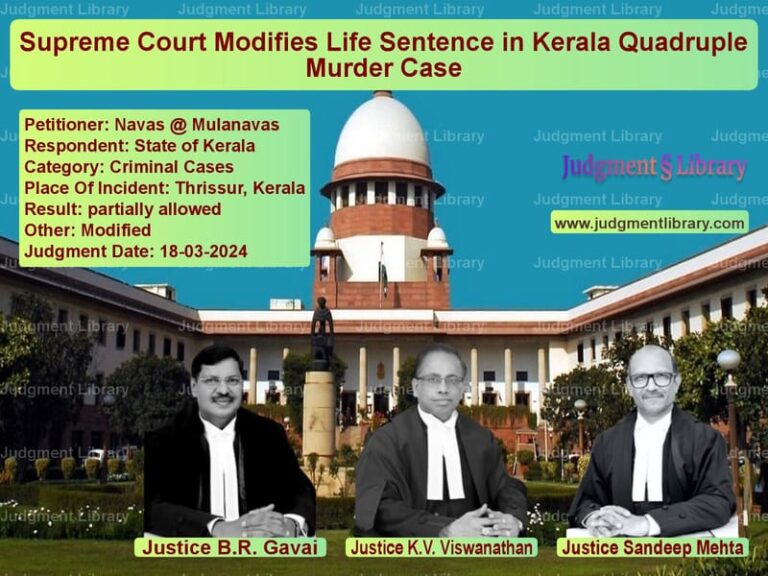Supreme Court Rules on Bail Cancellation: Protecting Liberty Under Article 21
The Supreme Court of India recently ruled in Parvinder Singh Khurana v. Directorate of Enforcement, addressing the legality of an interim stay on a bail order and clarifying the scope of judicial discretion under Section 439(2) of the Code of Criminal Procedure (CrPC). The judgment underscores the importance of protecting the fundamental right to liberty under Article 21 of the Constitution.
Background of the Case
The case arose from an Enforcement Directorate (ED) investigation into allegations of money laundering linked to the financial transactions of Jay Polychem India Ltd. The Central Bureau of Investigation (CBI) initially registered a case under Sections 120B, 420, 467, 468, and 471 of the Indian Penal Code (IPC) and Section 13(2) read with Section 13(1)(d) of the Prevention of Corruption Act, 1988.
On February 23, 2021, the ED registered an Enforcement Case Information Report (ECIR) under Section 4 of the Prevention of Money Laundering Act (PMLA). Though the appellant, Parvinder Singh Khurana, was not initially named as an accused, he was later arrested on January 20, 2023, after repeated summons.
Key Legal Issues Considered
- Whether the High Court or Sessions Court can stay a bail order pending an application for its cancellation under Section 439(2) of the CrPC.
- Whether the interim stay of the bail order violated Article 21 of the Constitution.
- Whether the principles of judicial review permit courts to grant an ex-parte stay on bail orders.
Arguments by the Appellant (Parvinder Singh Khurana)
- The stay on the bail order was arbitrary and violated his right to liberty.
- The High Court failed to record any reasons for granting the stay.
- The bail application had already been considered on merits by the Special Court, which granted bail.
- The delay in deciding the cancellation application led to his prolonged detention, violating his fundamental rights.
Arguments by the Respondent (Directorate of Enforcement)
- The High Court had the discretion to stay the bail order pending adjudication.
- The order granting bail was illegal and needed review.
- The appellant’s financial dealings warranted deeper scrutiny, justifying the interim stay.
- The power to cancel bail includes the power to stay its operation.
Supreme Court’s Findings
The Supreme Court emphasized that the power to stay a bail order must be exercised cautiously and only in rare cases. The key observations included:
- Article 21 Protection: Bail restores the liberty of an undertrial, which cannot be taken away lightly.
- Judicial Discretion: Courts must record clear reasons before granting an interim stay on a bail order.
- Ex-Parte Orders: As a general rule, bail orders should not be stayed without hearing the accused.
- Delays in Adjudication: The prolonged delay in deciding the cancellation application resulted in an unjustified restriction of liberty.
Final Verdict
The Supreme Court set aside the High Court’s interim stay, ruling that:
- The appellant’s bail order, granted on June 17, 2023, must be upheld.
- Interim stays on bail orders should be issued only in exceptional cases.
- The High Court must expedite hearings in bail cancellation applications.
- All contentions regarding the merits of the cancellation application remain open.
The ruling establishes a precedent that judicial intervention in bail matters should not undermine constitutional liberties without sufficient justification.
Impact of the Judgment
- Strengthening Bail Jurisprudence: The judgment clarifies the limited scope for staying bail orders.
- Preventing Arbitrary Detentions: Courts must ensure procedural safeguards before depriving individuals of liberty.
- Balancing State Interests and Individual Rights: The ruling affirms that bail decisions require careful judicial scrutiny.
Conclusion
The Supreme Court’s decision in this case reinforces the fundamental principle that personal liberty cannot be curtailed without valid and exceptional reasons. It underscores the judiciary’s responsibility to uphold the rule of law while balancing state interests in criminal investigations.
Petitioner Name: Parvinder Singh Khurana.Respondent Name: Directorate of Enforcement.Judgment By: Justice Abhay S. Oka, Justice Augustine George Masih.Place Of Incident: India.Judgment Date: 23-07-2024.
Don’t miss out on the full details! Download the complete judgment in PDF format below and gain valuable insights instantly!
Download Judgment: parvinder-singh-khur-vs-directorate-of-enfor-supreme-court-of-india-judgment-dated-23-07-2024.pdf
Directly Download Judgment: Directly download this Judgment
See all petitions in Bail and Anticipatory Bail
See all petitions in Fraud and Forgery
See all petitions in Money Laundering Cases
See all petitions in Judgment by Abhay S. Oka
See all petitions in Judgment by Augustine George Masih
See all petitions in allowed
See all petitions in Quashed
See all petitions in supreme court of India judgments July 2024
See all petitions in 2024 judgments
See all posts in Criminal Cases Category
See all allowed petitions in Criminal Cases Category
See all Dismissed petitions in Criminal Cases Category
See all partially allowed petitions in Criminal Cases Category







